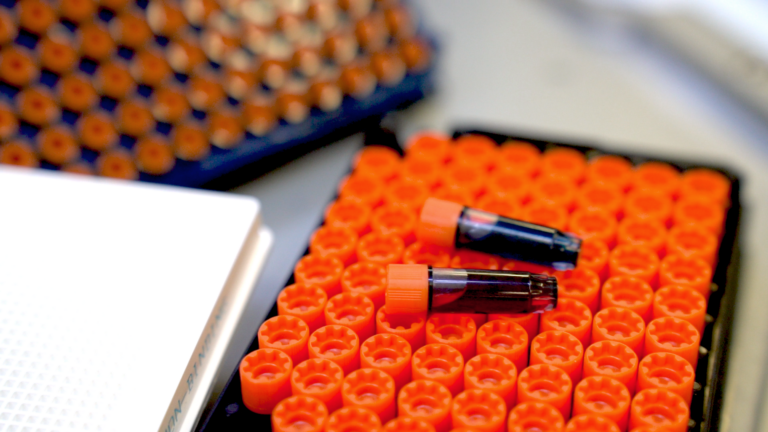It is the end of an era and the start of the next phase of growth at Compounds Australia.
With recent infrastructure and library upgrades, the TIA facility and ACRF Centre for Compound Management and Logistics is looking to support more researchers and accelerate more drug discovery projects than ever.
Established in 2008 with one robotic platform and a 200,000-compound storage capacity, the two STP LabTech ComPOUND stores that first opened their doors to Australian researchers have now been decommissioned. The STP CoMPOUND stores were crucial for the rapid expansion of Compounds Australia, enabling storage capacity to be tripled over the next 4 years.
Taking the place of that legacy storage are two high-density storage systems, which are to be integrated into the suite of four advanced liquid handling platforms. The Azenta SampleStore and Hamilton Verso M3 stores are now open to users, receiving both open- and closed- sample libraries from member organisations.
Combined with updated open-access libraries and the recently launched Smart Compounds – a custom-designed web platform allowing researchers to interface with the open access compound collections – Compounds Australia has ushered in a new era.
Compounds Australia, located at Griffith University, is Australia’s only dedicated open access chemical compound management facility, storing and distributing a collection of 1.5 million compounds to researchers in customised, assay-ready microplates.
Supporting over 150 unique drug discovery projects annually, Compounds Australia is the bedrock of TIA’s national Small Molecules Therapeutics Capability, supporting organisations across the academic, biotech and pharmaceutical sectors.
Recent upgrades have significantly built Compounds Australia’s capacity to support drug discovery research in Australia, and were made possible with generous contributions from many funding partners including the Australian Cancer Research Foundation (ACRF), MTP Connect, Griffith University, Queensland State Government, the Ian Potter Foundation, and Therapeutic Innovation Australia.

Compounds Australia provides next-generation compound management in Australia.
Compounds are stored in 2D barcoded microtubes and/or microplates under industry standard storage conditions that ensure sample integrity and extend the life of compound libraries. At 18°C, the Azenta SampleStore will hold approximately 400,000 acoustiX tubes and 4,000 plates, while the flexible configuration of the 4°C Hamilton Verso M3 is currently set up to house 550,000 0.5mL storage tubes and 10,000 plates, with an additional 30% of shelving space as yet unassigned.
Both stores are integrated (or in the process of being integrated) with robotic liquid handling platforms, seamlessly automating the transition between sample storage and dispensing. This integration reduces manual handling interventions at all steps in the process, ensuring sample movements are tracked, logged and tracible across most of the sample’s lifespan at Compounds Australia.
Sophisticated liquid handling systems utilise cutting-edge acoustic technologies, collectively capable of dispensing precise volumes from 2.5 nanolitres to 250 microlitres in a range of flexible formats.
The Azenta SampleStore is fully integrated to the HighRes Biosolutions robotic platform, with the store’s central shuttle, plate selector, and tube picker manoeuvring and delivering samples to the platform via an integrated handoff arm. The platform is equipped with both an Agilent Bravo and a Beckman ECHO-650T liquid handlers, enabling transfers in both microlitre and nanolitre quantities.
Expertly curated compound libraries at your fingertips.
Each library at Compounds Australia is an expertly curated collection of small molecules. Researchers can browse available compounds through the open access Smart Compounds, then order assay-ready plates for delivery to their door.
Researchers from any member organisation can access Compounds Australia’s open-access collection, which include the recently updated fragment-, drug-, and scaffold-libraries as well as academic libraries, unique screening sets synthesised and deposited by Australian chemists.
Compounds Australia additionally manages – and enables access to – specialised compound collections.
The Australian Drug Discovery Library was designed and assembled by a collaborative Australian Lead Identification Consortium, and contains 330,000 compounds representing the chemical space of 1 million diverse, lead-like compounds.
Compounds Australia is also home to NatureBank, a unique drug discovery resource based on natural product extracts and fractions made available for biodiscovery projects at universities, research institutes, and companies around the world.
By enabling researchers to avoid the time-consuming, laborious and error-prone procedures in compound preparation and provision, and providing them a means to effectively store and manage their compound libraries, Compounds Australia provides researchers with the critical management infrastructure and expertise to accelerate drug discovery.

